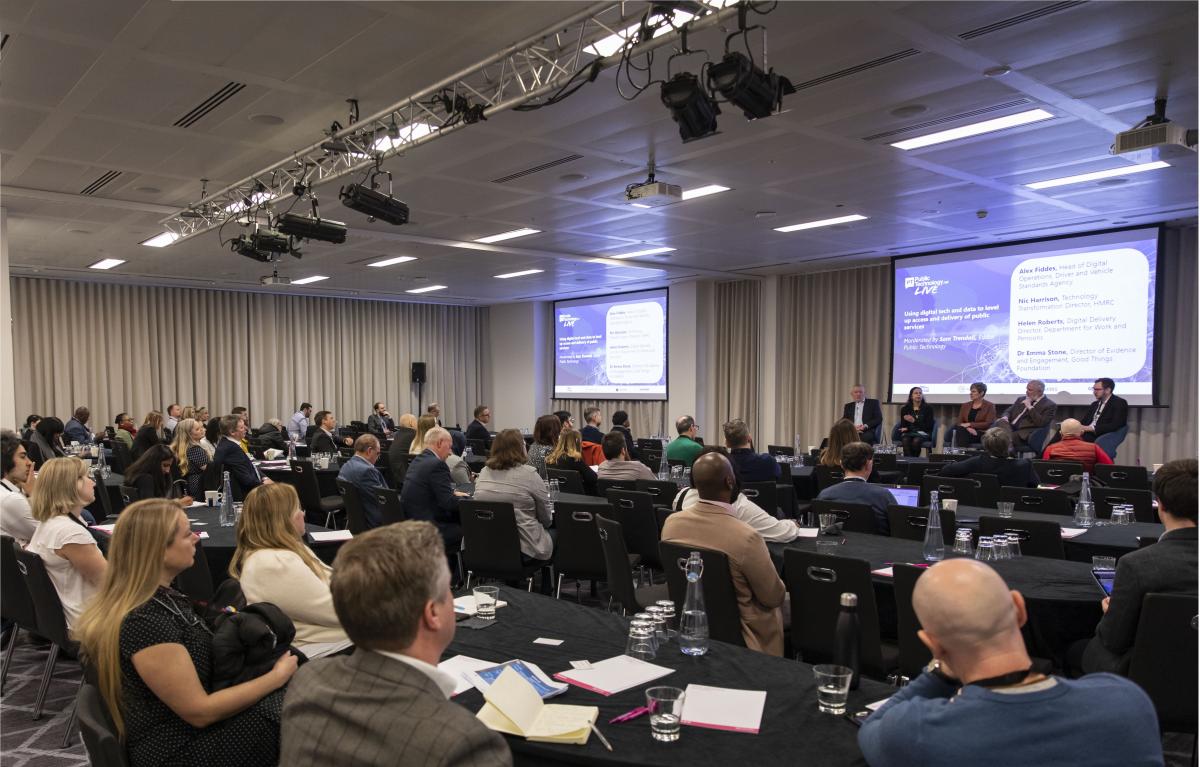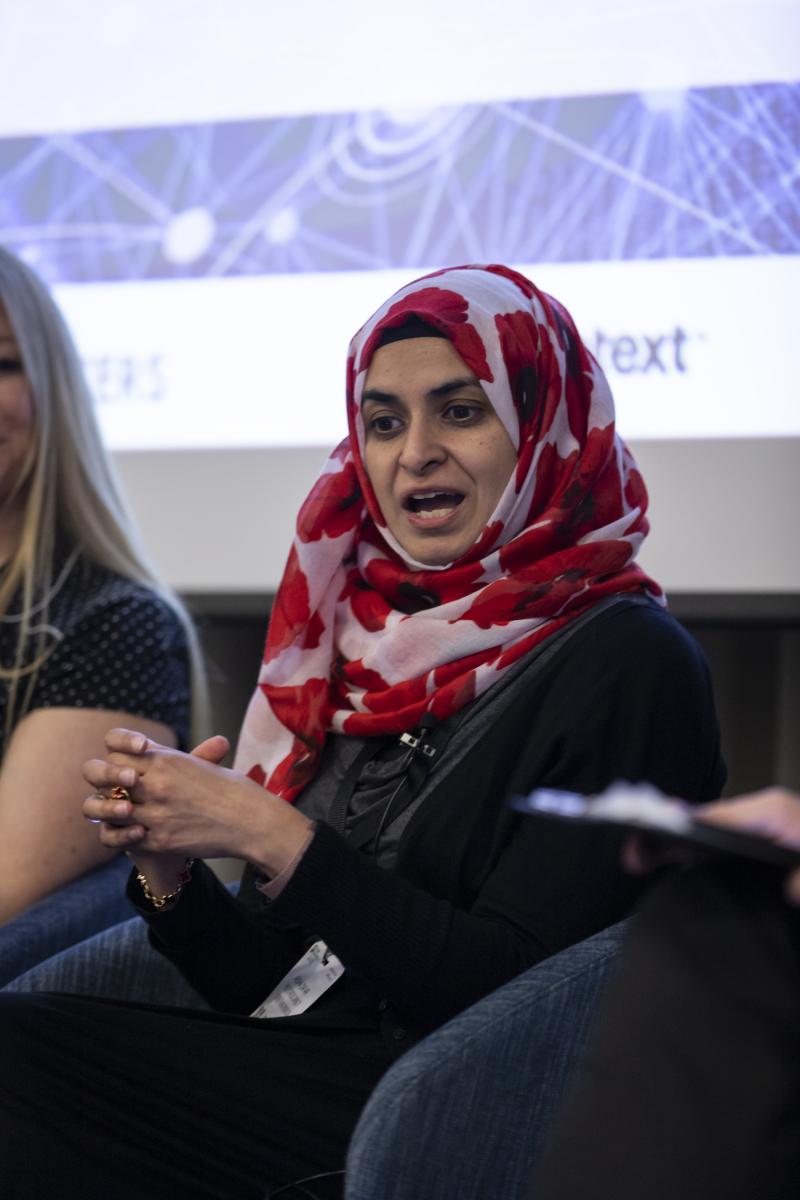Data delays, mice mix-ups and septuagenarian software skills – eight things we learned at PublicTechnology Live
As PublicTechnology gathered its audience for our annual summit, senior digital leaders from across the public sector discussed their priorities and challenges, and some of the more unexpected aspects of their work
Credit for all pictures: Tom Hampson/Visual Eye Creative
Hosted in London last week, the PublicTechnology Live annual conference gathered scores of senior public sector digital and data professionals.
As well offering exploring their biggest challenges and priorities for the months ahead, speakers also enlightened attendees to some of the more unexpected and unusual considerations of their work.
Here are eight things we learned.
It can take a year to get access to government data
A government analyst or academic researcher asking for a data set can currently wait up to a year to receive it, said Dominic Hale of the Office for National Statistics.
To accelerate this process, the new Integrated Data Service managed by ONS is working on a broad agreement where users do not have to apply for data every time they want to use it. The service, currently running in a limited form before a full launch in 2024, is designed to provide accredited people with secure access to government data on society and the economy to support research and government decision-making. Hale, who is head of strategy for the new service, said that individual citizens are neither identified nor identifiable in the data, although it does include information on individual households. It should reduce bureaucracy, with academics likely to need to answer 11 questions to get access to data compared with 76 for an existing research environment.
HMRC has to convince some senior technologists not to retire
Some legacy computer systems run by HM Revenue and Customs can only be supported by technologists “well into their 70s”, technology transformation director Nic Harrison event attendees.
“We regularly have to persuade individuals not to retire on bended knee,” he said.
“We are not being compared to what happens in Solihull or Coventry, we are being compared by our student population to Deliveroo.”
Wendy Griffiths, Birmingham City Council
HMRC has a programme, Securing our technical future, dedicated to moving such systems onto more modern hardware while leaving the software unchanged, but there are years of work ahead. Harrison said that projects to update existing systems are easy to put off for cost reasons, but “it’s coming home to roost a bit”.
One legacy technology Harrison is happy to support is the telephone. While HMRC might be digital-first, it is not digital-exclusive: “Real experts on tax should still be available at the end of the phone, that’s what the public wants,” he said. “The real challenge is not letting the perfect be the enemy of good. We should have digital services that work most of the time for most people, but we then need to make provision for people that need extra help, whether through accessibility issues or plain ‘I just don’t understand this’.”
 Some theory test candidates cannot drive – a mouse
Some theory test candidates cannot drive – a mouse
The Driver and Vehicle Standards Agency (DVSA) tries to go the extra mile in helping people to take the driving theory test.
Most people sit the test at a DVSA centre using a desktop computer, but some young people do not know how to use them.
“The amount of times in our centres we have to explain what a mouse is,” Alex Fiddes, head of digital operations, told a panel session (pictured) on accessibility and delivery of services.
When required, DVSA can provide someone to read the questions out, modify the language or let candidates take the test at home.
“There’s a percentage of people who can’t use digital and we have to admit that our service offering is not suitable for everybody,” said Fiddes. “For most people who get a driving licence… it’s a life-changing event. I have a responsibility to help those people go through that journey.”
One person who took the test at home used his new licence to apply successfully for a delivery job: “That’s changed his life, his carer’s life and his parents’ lives,” Fiddes said, adding that it shows the importance of catering for those with special requirements.
No-one ever says they love Coventry City Council’s ICT strategy
People tend to tell councillors about the impact of technology rather than the technology itself, according to Randhir Auluck, a councillor at Coventry City Council and a school at head of Westminster’s Business School. “When I’m out on the street, I have never heard anybody say ‘I really love your ICT strategy,” she told a panel session. “They will talk about how difficult it is to get through to the council.”
People tend to complain to councillors when service delivery goes wrong, particularly when this happens repeatedly and when subsequent complaints are ignored.
Auluck added that people in Coventry tend to see the council as a single entity, services and councillors included, and a failure to act as one organisation hits their confidence in the council. “I get emails saying ‘do you know what you are doing, you can’t organise yourselves out of a paper bag’. We can, but perhaps we need to do better explaining ourselves,” she said. Stronger integration, including with partner organisations such as local NHS bodies and housing associations, would contribute to this.
 DWP Digital thinks long-term about its staffing
DWP Digital thinks long-term about its staffing
Staffing a technology service properly means developing tomorrow’s staff as well as recruiting today’s, according to Aesha Zafar, head of strategic capability for the Department for Work and Pensions DWP Digital unit. “It’s about having that flow of people, ensuring that you’re not thinking for the short term,” she said, including work with schools and coding camps as well as setting up career pathways within the organisation.
Zafar (pictured right) said that DWP created a specific grade for junior technical staff for this reason: “We want a steady flow of people who come in at a junior level that can go up,” she said.
Long-term development can involve training people who then leave for better-paid private sector jobs. Zafar said that some would return to the public sector later, as it offers breadth, impact and public service: “I feel there’s a public service element of training people for the greater good,” she said.
Ten million Britons lack basic digital skills
Millions of people are excluded from digital services making an inclusive approach vital, Dr Emma Stone, director of evidence and engagement of Good Things Foundation, told the same session. One in 20 households have no internet access according to Ofcom and 10.2 million people in the UK lack basic digital skills according to 2022’s Essential Digital Skills research of more than 4,000 people by Ipsos Mori for Lloyds Bank. Having strong digital skills can save people an average of £659 annually, the same research found.
Good Things Foundation will shortly launch an improved version of its free platform for digital learning, Learn my way. Although older people tend to do less digitally, Stone said that the young can need help too – experienced gamers can struggle with online forms, for example. The foundation is also building a national device bank which will provide refurbished devices to disadvantaged communities: “We are looking for donations of tech – devices, laptops, phones, PCs,” she said. These will be checked and securely wiped by partners.
“We can take care of distributing these devices out into the community, across the UK to people who really need them," Stone added.
Around seven in 10 digital projects fail to deliver
About 70% of digital projects fail to do what they say they will, James Freed, chief digital and information officer for Health Education England, told a panel session on developing digital leaders. “It doesn’t mean complete disaster, just that the predictions made in the business case were not met,” he said. This is partly because business cases often include guesses and end-of-project reports tend to present the results as favourably as possible . Freed said that this shows the value of an agile approach, which does not try to design or predict the outcomes: “Ideally start small and then scale blooming fast,” he said.
Birmingham calls service users ‘customers’ for a reason
Birmingham City Council considered ‘citizens’ as the general term for its service users, but chose ‘customers’ to include businesses and visitors as well, with assistant director Wendy Griffiths pointing out that last year the city hosted the Commonwealth Games. She told a panel session on transforming and enhancing user experiences that the city’s digital services sit alongside those provided by online businesses: “We are not being compared to what happens in Solihull or Coventry, we are being compared by our student population to Deliveroo.”
"Real experts on tax should still be available at the end of the phone, that’s what the public wants."
Nic Harrison, HMRC
Treating people as customers means respecting their preferences, Griffiths added, such as by providing a choice of channels rather than forcing people to use a single technology. She added that some of the city’s 1,200 processes work well through automated self-service, such as reporting potholes or missed bin collections, but others do not, and they are unlikely ever to run all of them through a single customer relationship management system. According to research with panels of citizens, it is more important that people only have to tell the council about something once, however this works. Griffiths added that the city council’s 11,000 staff, who mostly live in Birmingham, are asked for their views on how its digital processes work for them as locals.
Share this page
Tags
Categories
CONTRIBUTIONS FROM READERS
Please login to post a comment or register for a free account.
Related Articles
In the first of a series of exclusive interviews, the head of government’s ‘Digital HQ’ talks to PublicTechnology about the Central Digital and Data Office’s work to unlock £8bn...
Chancellor Jeremy Hunt launches scrutiny exercise
Overwhelming majority of respondents voice disapproval but government will press on with plans to bring forward legislation
Leaders announced agreed-in-principle initiative as part of trade partnership
Related Sponsored Articles
The traditional reactive approach to cybersecurity, which involves responding to attacks after they have occurred, is no longer sufficient. Murielle Gonzalez reports on a webinar looking at...
